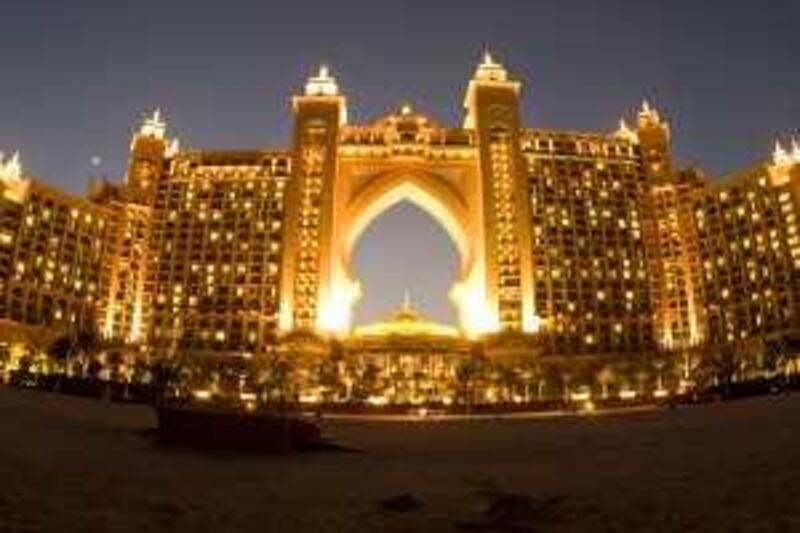Recent major sporting events in the UAE, including the Abu Dhabi Grand Prix and the Dubai World Championship golf tournament, are beginning to capture world attention alongside the more established aspects of life in the country, according to a five-nation survey commissioned by The National.
In the UK, 18 per cent of respondents said hosting world-class sporting events was primarily symbolic of the UAE. Despite recent publicity surrounding January's planned opening of the Burj Dubai, the world's tallest building, 17 per cent cited skyscrapers as the most potent symbol. The findings form part of The National's survey of five countries on the perceptions of the nation, carried out to mark the country's 38th birthday. More than 2,000 people from Britain, the United States, India, Egypt and Saudi Arabia took part.
On a similar theme, 10 per cent from the UK identified the UAE with sporting sponsorships and acquisitions, such as the purchase of Manchester City Football Club last year. However, it is a different story in America where the figure was just three per cent. In the US, 20 per cent selected skyscrapers as being symbolic of the country and just nine per cent chose sporting events. In contrast, hotels seem to occupy a large part of American perceptions. Some 62 per cent of US respondents had heard of Dubai's Atlantis hotel. Curiously, however, that recognition slid to 43 per cent for the UK, 35 per cent in Saudi Arabia, 31 per cent in India and just 16 per cent in Egypt.
Cultural initiatives, such as the planned opening of branches of the Louvre and Guggenheim museums, also registered relatively low levels of recognition. However, when the institutions open their doors in the cultural district on Saadiyat Island some time after 2012, that is likely to have changed, say experts. "We have marketing campaigns to identify people's vacation habits and then present what the country has to offer from that research," said Lawrence Franklin, the strategy and policy director of the Abu Dhabi Tourism Authority.
"We have a strategic plan and yes, of course, we want to attract people to come to the capital. We [intend] to - create Abu Dhabi as a future world-class destination or a destination of distinction." At the moment, however, the capital is not seen as the prime venue for foreign visitors. According to the survey, westerners regard Dubai as more of a tourist destination than Abu Dhabi. Dubai is also more strongly associated with entertainment, with an overall 70 per cent favouring it against 21 per cent for Abu Dhabi.
Almost 10 per cent of respondents in the UK had visited the UAE, with another 84 per cent aware of the country. Only seven per cent had never heard of it. This contrasted strongly with the US element of the survey, in which 38 per cent of respondents had never heard of the UAE. In addition, almost no one said they had visited and just 59 per cent were aware of the country. By comparison, almost 20 per cent of Indians polled had visited the country.
Among potential visitors, tourism, with 82 per cent, was the primary draw. Despite the high number of British expatriates here, just three per cent said they would be visiting the country to look for work. In the US, potential tourists were much thinner on the ground with only 10 per cent saying they might visit and 80 per cent certain they would not. Of UK respondents who would not visit, 51 per cent cited a perceived high cost of living as the main deterrent. Mainly negative coverage in the western media regarding areas such as Iran, and the Iraq situation, seems to have had an impact, too. Some 26 per cent stated a fear of the political situation in the region was a major deterrent.
Surprisingly, perhaps, the "language barrier" would dissuade 16 per cent, despite English being widely spoken throughout the business and leisure sectors. For Americans, the perceived deterrents differed slightly. Again, more than half (55 per cent) were deterred by the cost of living, but fear of the regional political situation was even more pronounced than in the UK with 45 per cent citing it as a reason to stay away.
Overall, the five countries polled showed a general awareness that the emirates have developed distinct, but mutually beneficial, identities. "The differences between Abu Dhabi, Dubai and all of the northern Emirates very much complement each other," said Rita Aoun-Abdo, the cultural and arts director for the Tourism Development and Investment Council in Abu Dhabi. aseaman@thenational.ae jgornall@thenational.ae






